Special Local Government Conference 24 March 2015
Conference sets out new pay campaign strategy
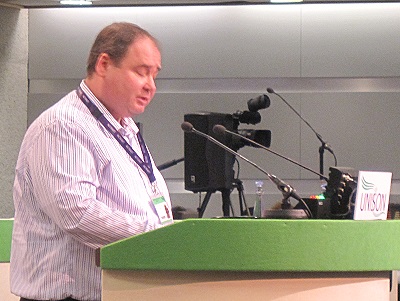 |
| Mark Ferguson, Chair, Scottish Local Government Committee
and SJC UNISON Trade Union Side |
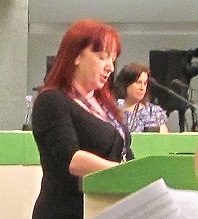 |
| Inez Teece |
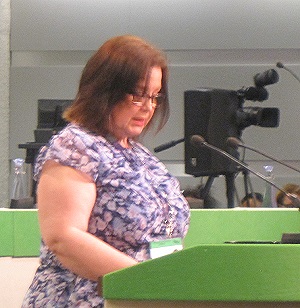 |
| Susan Kennedy |
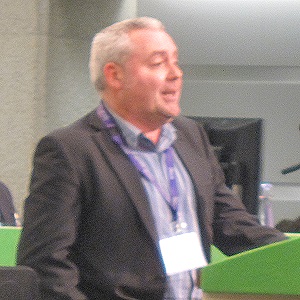 |
| Scott Donohoe |
Scotland played an important role as UNISON local government
delegates from across the UK met at this special conference
in London.
The conference was called primarily to debate the lessons
of the recent pay campaign in England and Wales and agree
a set of strong proposals to increase member engagement
and democratic participation in every aspect of future pay
campaigns. However Scotland had an important part to play
as we shared the lessons from our own pay campaign.
Delegates backed two motions from Scotland. The first called
for our bargaining and industrial strategies for fair pay
to be allied with a consistent, sustained and coherent political
strategy, aimed at addressing the “30 years trends
of suppressing wages...”
Moving the motion, Scottish Delegate Inez Teece, said,
“Local government pay has not been a political priority
for recent governments in fact the contrary, there has been
deliberate attempts to drive down pay and to devalue the
work, the vital work that we all do.
“Often it is our members that are believing the rhetoric
that there is no other way and to just accept the hand we
are dealt and that we are not worth it.
She told conference that in Scotland we have adopted an
industrial action strategy that has political lobbying at
the heart of everything we do seeking to influence political
parties at all levels, not as a one off process but a continuing
fight showing both the membership and the politicians that
we mean business and that we are worth it.
She said, “To achieve a decent day's pay for a decent
day's work we not only have to convince our members but
also the politicians.
“We need to ensure all elected representatives are
aware of our plight but also how their decisions are affecting
the services and the people that deliver those services.
“We need to build strategies that encompass political
lobbying so that all politicians cannot say they didn't
know,” said Inez, calling for further development
is needed to ensure a long-term project is developed, not
only in Scotland but across all nations, in a consistent
and coherent way, allied to our other industrial strategies
alongside other unions.
Susan Kennedy, Scottish representative on Local Government’s
national ruling body, the Service Group Executive, also
supported the motion.
The conference also backed Scotland’s second motion,
moved by Scott Donohoe, calling for future campaigns to
ensure lay involvement in pay negotiations, something that
we already have in our Scottish structures, and to increase
member participation and engagement in the fight for fair
pay.
It also called for more joined up working with the other
trade unions based on a set of agreed principles, strategies
and timescales.
During a day of impassioned speeches and strong feelings
about the impact of the government’s continuing pay
freeze and years of declining pay in local government, a
range of composites and motions were agreed, which pledged
the union to ensure a UK-wide perspective on all pay campaigning;
to put women and gender equality at the heart of campaigning;
to work jointly with other unions and to build bargaining
and industrial strength through a massive recruitment and
organising effort.
Kate Ramsden
Communications and Campaigns Committee
top
Pre-conference briefing
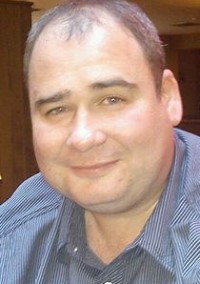 |
| Message from Mark Ferguson, Chair, Scottish
Local Government Committee and SJC UNISON Trade Union
Side |
This Special Requisitioned Local Government Conference
has been called to allow a debate to take place around pay,
negotiations and consultation procedures.
This UK wide conference will consider 54 motions from across
the regions.
The Scottish Local Government Committee has submitted two
motions, Motion 37 'Campaigning for Fair Pay for Local Government
Workers' and Motion 41 'Pay Consultation Procedures'.
Motion 37 centres around campaigning involving
political and improved industrial strategies, low pay and
a long term project plan aimed at addressing 30 years of
suppressed wages.
Motion 41 seeks to amend the current -
and new consultation procedures (if approved) - to include
the need for lay involvement in decisions and negotiations,
to seek the agreement of other trade unions covered by the
relevant bargaining machinery to a set of principles, campaign
strategies and timescales prior to the submission of a joint
claim and engagement of members at the grassroots to build
and effective and political industrial campaign on pay.
I would encourage branches to participate in debates and
remember that motions which restrict Scotland from voting
under rule P.1.3.6 still allow Scottish input into the discussion/debate.
Rule states:
"Standing Orders Committees for Service Group Conferences,
in exercising powers in accordance with Rule P.2.3, shall
have regard to the national negotiating machinery in devolved
administrations. The Standing Orders Committee may make
recommendations to restrict voting to representatives of
members covered by that machinery which shall be subject
to ratification by Conference in accordance with Rule P.2.4."
Your two Regional Representative from the Scottish Local
Government Committee are Scott Donohoe (Glasgow City Branch)
and Inez Teece (Aberdeenshire Branch). Please contact them
should you require advice/assistance and remember it is
important that you advise them as early as possible if you
intend to take part in a debate to allow them to liaise
with rostrum control and other regions. They will be available
on the floor of Conference.
Your Local Government Service Group Executive members on
the platform are Mark Ferguson (Renfrewshire Branch), Carol
Ball (Vice Chair of the LGSGE - Glasgow City Branch), Susan
Kennedy (Aberdeenshire Branch), Alison McCorquodale (Western
Isles Branch) and Colin Paterson (Fife Branch).
I look forward to seeing you all at Conference.
Advice on Conference themes
1. Re-open NJC Pay Negotiations 2015/16
Scottish SGE Reps' View: This is a matter
for members covered by NJC pay, terms and conditions therefore
it is unlikely that Scottish delegates will have a vote
under rule P.1.3.6. The Service Group Executive is OPPOSING
this on the basis that these negotiations have ended following
a members' ballot where 64% of those voting accepted the
employers' offer.
2. Suspension of Strike Action
Motions containing this are, in the main, stating that
any decision to suspend strike action must involve a consultation
process that is clear and transparent involving branches
and regions which, at a minimum, is at the same level as
the consultation process which agreed the claim.
Scottish SGE Reps' View: This could prove
impracticable due to timescale and depending on what stage
you are at in your industrial action campaign. This, if
carried, would mean that the Scottish Local Government Committee/Scottish
Joint Council UNISON Side would be unable to take a position
to suspend strike action on an improved offer without the
agreement of branches.
For example, if an employer made an offer the day before
planned industrial action, we would be bound by rule to
continue the action as time would not permit to consult
branches and subsequently for branches to consult members.
The Scottish SGE Reps would encourage branches
to oppose motions or amendments that would restrict SJC
decision making.
3. Lay Activist Involvement
A significant number of motions seek to amend the consultation
procedures by stating that there should be no negotiations,
discussions or decisions without lay member involvement.
Scottish SGE Reps' View: Your LGSGE Reps
are broadly in favour of these proposals, however we recognise
that this should not preclude the ability to have informal
off the record discussions.
We would encourage branches to support Scottish Motion
41 which states ‘That there should be lay activist
involvement in all decisions and negotiations.
This does not exclude the ability to have informal/off
the record discussions. Both lay activists and paid officials
should work in partnership and ensure that each is aware
of all developments.’
We would encourage branches to oppose motions or
amendments which do not reflect the Scottish Motion.
4. LGSGE Consultation Procedures on Pay
At last year's Local Government Conference a commitment
was given by the LGSGE to consult Regions and Branches on
the current pay consultation procedures and bring proposals
back to the 2015 Local Government Conference.
Given that the consultation has taken place and the calling
of the Special Requisition Conference, a decision was taken
to submit Motion 43 Pay Consultation Procedures.
Scottish SGE Reps' View: It is important
that Motion 43 is debated and agreed in order for all nations/regions
within the UK to move forward in future pay negotiations
which would allow a more member-centred approach in consultations
and establishing political and industrial campaigns on pay.
It is our understanding that full copies of the pay consultation
procedures should be available at the Conference as Standing
Orders Committee did not allow for inclusion of the document
in the preliminary or final agenda.
Other motions to look out for:
Motion 5 - North West Region - A Decent Pay Increase
for Local Government Members
Scottish SGE Reps' View: It is unlikely
that Scotland will be able to vote on this motion under
Rule P.1.3.6., however the LGSGE is concerned that it seeks
to re-open the NJC negotiations for 2015-16.
Motion 44 - NJC Local Government Committee - NJC
Pay Campaign 2016
Scottish SGE Reps' View: This motion seeks to address
concerns and criticisms of the NJC Committee's handling
of pay 2014-16 - this is not a matter for Scottish Delegates,
however the motion sets out a number of recommendations
for future pay negotiations we may wish to consider in Scotland.
|



